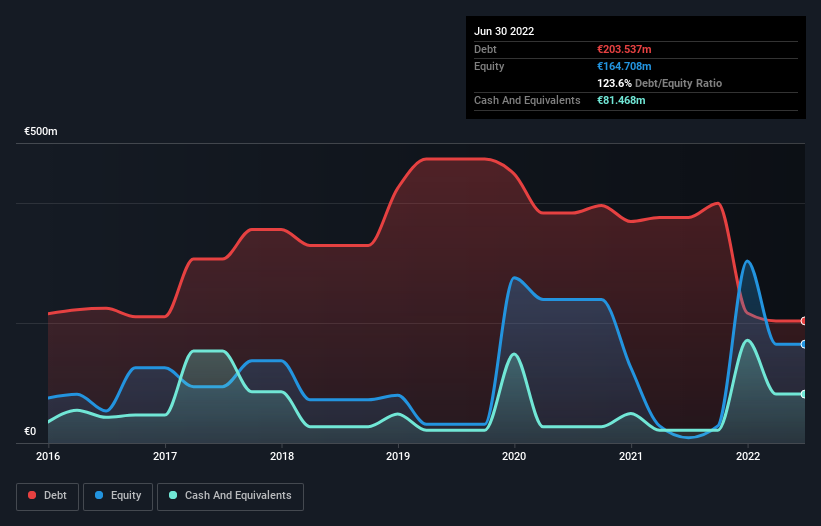
Some say volatility, rather than debt, is the best way to think about risk as an investor, but Warren Buffett famously said that 'Volatility is far from synonymous with risk.' So it might be obvious that you need to consider debt, when you think about how risky any given stock is, because too much debt can sink a company. Importantly, Juventus Football Club S.p.A. (BIT:JUVE) does carry debt. But should shareholders be worried about its use of debt?
When Is Debt A Problem?
Debt assists a business until the business has trouble paying it off, either with new capital or with free cash flow. Ultimately, if the company can't fulfill its legal obligations to repay debt, shareholders could walk away with nothing. However, a more frequent (but still costly) occurrence is where a company must issue shares at bargain-basement prices, permanently diluting shareholders, just to shore up its balance sheet. Of course, debt can be an important tool in businesses, particularly capital heavy businesses. The first thing to do when considering how much debt a business uses is to look at its cash and debt together.
Check out our latest analysis for Juventus Football Club
How Much Debt Does Juventus Football Club Carry?
You can click the graphic below for the historical numbers, but it shows that Juventus Football Club had €203.5m of debt in June 2022, down from €375.8m, one year before. On the flip side, it has €81.5m in cash leading to net debt of about €122.1m.

How Strong Is Juventus Football Club's Balance Sheet?
We can see from the most recent balance sheet that Juventus Football Club had liabilities of €384.2m falling due within a year, and liabilities of €382.8m due beyond that. Offsetting these obligations, it had cash of €81.5m as well as receivables valued at €117.0m due within 12 months. So its liabilities total €568.5m more than the combination of its cash and short-term receivables.
This deficit is considerable relative to its market capitalization of €795.7m, so it does suggest shareholders should keep an eye on Juventus Football Club's use of debt. This suggests shareholders would be heavily diluted if the company needed to shore up its balance sheet in a hurry. There's no doubt that we learn most about debt from the balance sheet. But ultimately the future profitability of the business will decide if Juventus Football Club can strengthen its balance sheet over time. So if you want to see what the professionals think, you might find this free report on analyst profit forecasts to be interesting.
In the last year Juventus Football Club had a loss before interest and tax, and actually shrunk its revenue by 7.4%, to €436m. That's not what we would hope to see.
Caveat Emptor
Over the last twelve months Juventus Football Club produced an earnings before interest and tax (EBIT) loss. Indeed, it lost a very considerable €221m at the EBIT level. Considering that alongside the liabilities mentioned above does not give us much confidence that company should be using so much debt. So we think its balance sheet is a little strained, though not beyond repair. Another cause for caution is that is bled €190m in negative free cash flow over the last twelve months. So in short it's a really risky stock. There's no doubt that we learn most about debt from the balance sheet. However, not all investment risk resides within the balance sheet - far from it. Be aware that Juventus Football Club is showing 3 warning signs in our investment analysis , and 2 of those make us uncomfortable...
If, after all that, you're more interested in a fast growing company with a rock-solid balance sheet, then check out our list of net cash growth stocks without delay.
New: Manage All Your Stock Portfolios in One Place
We've created the ultimate portfolio companion for stock investors, and it's free.
• Connect an unlimited number of Portfolios and see your total in one currency
• Be alerted to new Warning Signs or Risks via email or mobile
• Track the Fair Value of your stocks
Have feedback on this article? Concerned about the content? Get in touch with us directly. Alternatively, email editorial-team (at) simplywallst.com.
This article by Simply Wall St is general in nature. We provide commentary based on historical data and analyst forecasts only using an unbiased methodology and our articles are not intended to be financial advice. It does not constitute a recommendation to buy or sell any stock, and does not take account of your objectives, or your financial situation. We aim to bring you long-term focused analysis driven by fundamental data. Note that our analysis may not factor in the latest price-sensitive company announcements or qualitative material. Simply Wall St has no position in any stocks mentioned.
About BIT:JUVE
Juventus Football Club
Operates as a professional football club in Italy.
Imperfect balance sheet very low.
Similar Companies
Market Insights
Community Narratives



